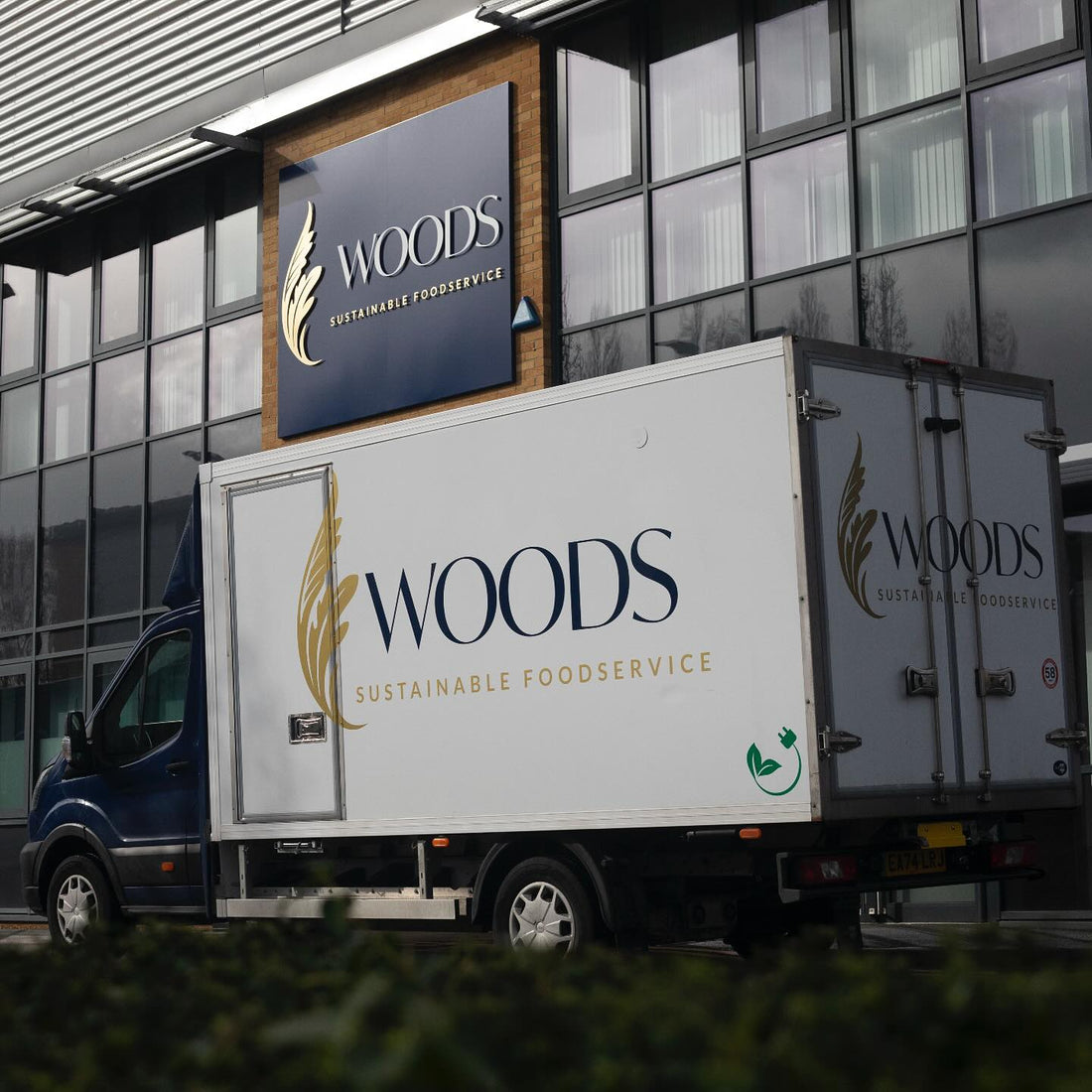When we decided to partner with Woods Foodservice for our commercial honey formats, sustainability wasn’t just a nice bonus; it was essential. The food industry generates enormous amounts of waste, from packaging to surplus stock, and we needed a distribution partner that shared our commitment to reducing environmental impact.
Woods Foodservice has built their entire operation around sustainability. Their comprehensive approach to waste reduction aligns perfectly with our values and creates a supply chain that makes sense for environmentally conscious kitchens.
Packaging That Doesn’t Add to the Problem
Our 3kg honey buckets were designed with waste reduction in mind from the start. Instead of forcing restaurants to order dozens of small jars, we created bulk formats that dramatically reduce packaging per serving. One bucket replaces roughly twelve 250g jars, cutting packaging waste by about 80%.
Woods Foodservice amplifies this benefit through their supplier collaboration programs. They actively work with partners like us to minimise unnecessary packaging materials from the source. It’s a great way to rethink how products get to professional kitchens without generating mountains of waste.
Their warehouse operations use in-house compactors to process cardboard and plastic efficiently. Everything gets baled and collected in full truckloads rather than frequent smaller pickups, reducing transportation emissions and improving recycling efficiency.
Technology That Eliminates Paper Waste
Woods Foodservice has replaced traditional paper-based ordering systems with digital alternatives that make a real difference. Their Warehouse Management System eliminated paper picking notes in favour of scanners. The online ordering portal, electronic Proof of Delivery (ePOD), and Electronic Data Interchange (EDI) software mean most transactions happen without paper at all.
For restaurants and cafés ordering our honey, this translates to streamlined processes that don’t generate unnecessary paperwork. Orders, confirmations, and deliveries happen digitally, reducing administrative waste while making the whole experience more efficient.
Food Waste Prevention Through Smart Management
Food waste is probably the biggest sustainability challenge in hospitality. Woods Foodservice addresses this through advanced warehouse management technologies and skilled purchasing teams that manage inventory to prevent spoilage. Their systems predict demand accurately, reducing the likelihood of products sitting in warehouses past their optimal quality.
For honey, this matters because even though honey doesn’t spoil in the traditional sense, maintaining optimal texture and flavour requires proper rotation and storage. Woods Foodservice’s expertise ensures our products reach kitchens in perfect condition while minimising waste throughout the supply chain.
Surplus Redistribution That Makes Sense
When surplus stock does occur, Woods Foodservice partners with FareShare, the UK’s largest network of charitable food distributors. Instead of sending excess products to landfills, they redirect them to local charities where they provide meals for people who need them.
This approach aligns perfectly with our philosophy about honey. These products represent the work of British beekeepers and the effort of responsible sourcing. Wasting them would be disrespectful to both the environment and the craftsmanship involved in creating quality honey.
Customer-Focused Recycling Services
Woods Foodservice extends their waste reduction efforts to their customers through clean cardboard and plastic collection services. Restaurants and cafés can coordinate with them to collect recyclable materials, creating a closed-loop system that reduces waste across the entire supply chain.
They also provide waste cooking oil collection through their partnership with Olleco. While this doesn’t directly relate to our honey products, it demonstrates the comprehensive approach that makes Woods Foodservice an ideal partner for sustainability-focused businesses.
Circular Economy in Action
The combination of bulk honey formats and Woods Foodservice’s waste reduction systems creates something closer to a circular economy. Larger containers mean fewer deliveries, less packaging waste, and more efficient use of transportation resources. Digital ordering systems eliminate paper waste. Surplus products get redistributed rather than discarded.
Our 30g mini jars, while smaller, serve a specific purpose that prevents waste in guest-facing situations. Hotels and cafés can portion honey precisely without over-serving or creating leftovers. The small format reduces the likelihood of opened containers going stale before use.
Supporting Responsible Sourcing
Our honey comes from responsible British beekeepers who maintain sustainable practices. Woods Foodservice’s commitment to waste reduction ensures that these efforts aren’t undermined by wasteful practices. Our partnership creates a complete chain of responsibility from hive to kitchen.
This matters because sustainability isn’t just about individual actions but about systems that support responsible choices. When restaurants want to source sustainably, they need partners throughout the supply chain who share those values.
Making Sustainability Practical
The reality of professional kitchens is that sustainability initiatives often fail when they create additional work or complications. Woods Foodservice’s approach makes waste reduction practical rather than burdensome. Digital ordering is easier than paper systems. Bulk formats reduce the frequency of reordering. Recycling services integrate with existing operations.
For chefs and kitchen managers who care about environmental impact but can’t sacrifice efficiency, this partnership provides both. The sustainability benefits happen automatically through better systems rather than requiring additional effort or compromise on quality.
Long-Term Impact
Individual actions matter, but systemic change happens when businesses throughout the supply chain commit to waste reduction. Our partnership with Woods Foodservices creates a model that other food companies can follow: bulk formats that reduce packaging, digital systems that eliminate paper waste, and redistribution programs that prevent surplus from becoming landfill.
The food industry has enormous potential to reduce waste, but it requires partnerships between suppliers, distributors, and restaurants who all prioritise environmental responsibility. Woods Foodservice proves that commercial success and waste reduction can happen simultaneously, creating better outcomes for everyone involved.
Our full range, including 3kg buckets and 30g mini jars, is available through Woods Foodservice. Join a supply chain that actually supports your sustainability goals instead of just talking about them. Find them here.

